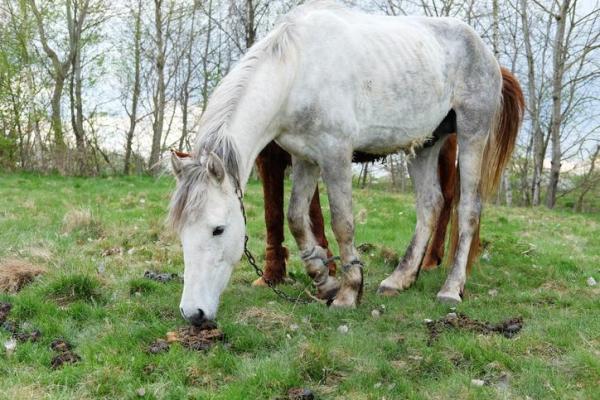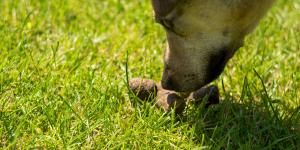Why Do Horses Eat Their Own Manure?



See files for Horses
Although horses are great animals and it is inspiring to watch them gallop, there are some behaviors that are unpleasant to watch, such as eating their feces, which some horses practice. This behavior is not only unpleasant, but can also promote the development of diseases caused by intestinal parasites. On the other hand, this behavior can also be caused by inadequate nutrition or poor housing. So, in a way, it helps us to identify and correct these deficiencies to alleviate the problem and improve the health of the animal.
In this AnimalWised article, we'll explain why your horse eats its feces and what you can do about it.
Inadequate accommodation
Coprophagy is a behavior in which a human or animal eats its own or another's feces. In horses, this behavior can be caused by inadequate exercise, inadequate environmental enrichment, or a small stall.
Coprophagy is often accompanied by other behaviors known as "stall vices". Stall vices are stereotypical, repetitive behaviors in horses caused by boredom, hunger, isolation, excess energy, or lack of exercise. If not managed properly, these behaviors not only cause damage to facilities from chewing, kicking, and repetitive movements, but can also have health consequences for the horse.
Also, stressed horses may start eating manure. Horses are routine animals; they like to eat at the same time every day. If a horse has frequent changes, it may develop this habit to cope.
If you are interested in learning more about your horse's emotional state, we recommend reading this article on horses body language.
Nutritional deficiencies
A lack of fiber may cause a horse to eat its own feces to meet its fiber needs. An adequate supply of fiber is necessary for the animal to achieve adequate acidity in the stomach. In addition, if the horse is deficient in vitamins or minerals, it may eat its own feces to make up for the deficiency.
On the other hand, it is not uncommon for foals to eat their mother's feces after weaning. One hypothesis is that they do this to absorb bacteria into their intestines that aid in digestion and are found in their mothers' feces. Nonetheless, if this behavior continues for more than six months, it becomes worrisome because it can lead to an infestation of intestinal parasites.
If you are interested in learning how to improve your horse's diet, we suggest reading this article on the best diets for horses.

Solutions to prevent the horse from eating its feces
Under normal conditions, it is advisable to deworm horses regularly with a product that kills intestinal worms. Since feces can also be a source of parasites, deworming is even more important for horses that eat their feces. We have already discussed how this behavior could indicate that your horse is suffering from nutritional deficiency or an insufficient environment, and we will outline how to correct it depending on the situation:
In the case of nutritional deficiencies:
In order for a horse's digestive system to function properly, it must eat fibrous foods such as straw or hay, so it is not advisable to feed it only forage. However, since hay or straw provide less energy than most horses need, concentrates must be added. In addition, horse feed is formulated to meet the animal's vitamin and mineral needs, so it must contain mineral blocks in addition to forage to compensate for any deficiency in these elements. These supplements usually do not have any adverse effects because horses usually eat only what they need, so overdosing is unlikely.
You should also keep in mind that, as with humans, horses have different metabolisms. Therefore, some horses will certainly become overweight if they are allowed to graze all day. In this case, you need to consider the type and quality of feed you offer. Instead of feeding two large meals, you could feed small, frequent meals.
In the case of inadequate accommodation
Horses are very active animals that need a lot of space to live and for regular exercise. Since a horse's digestive system is designed to continuously absorb fiber throughout the day, the horse should be allowed to graze as much as possible.
Often the barn where the animal is housed is not as large as we would like, so in these cases it is necessary to allow the animal frequent trips outside for exercise. It might also be a good idea to provide toys from the specialty store and use various distractions, such as a basketball.
Since horses are creatures of habit, if your horse continues to eat manure after these changes, it has already become a habit. Apart from the things we mentioned before, we also recommend that horse stalls and paddocks are cleaned regularly. If the problem persists, we recommend talking to your trusted veterinarian about it.

If you want to read similar articles to Why Do Horses Eat Their Own Manure?, we recommend you visit our Behavioral problems category.







